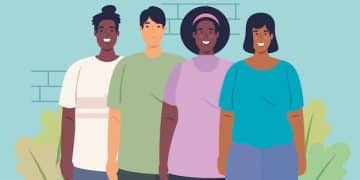Veteran Benefits: Your Comprehensive Guide to Healthcare, Education, and More

Veteran benefits encompass a wide array of support systems designed to assist those who have served in the U.S. military with healthcare, education, housing, and financial assistance, ensuring a smoother transition to civilian life and recognizing their sacrifices.
Are you a veteran or know someone who is? Navigating the world of veteran benefits can feel overwhelming. This guide breaks down everything from healthcare to education, housing, and financial aid, making it easier to understand and access the support you’ve earned.
Understanding Veteran Healthcare Benefits
Healthcare is a critical concern for veterans, and thankfully, a range of veteran benefits are available to ensure access to quality medical care. These benefits cover numerous services, aiming to cater to the diverse health needs of former service members.
Knowing what’s available and how to access these services can make a significant difference in maintaining your health and well-being.
Eligibility for VA Healthcare
The first step in accessing veteran healthcare benefits is understanding eligibility. Generally, if you served in the active military, naval, or air service and were separated under any condition other than dishonorable, you may qualify for VA healthcare benefits.
However, the specifics can vary, so it’s crucial to check the current criteria.
- Priority Groups: The VA uses a system of priority groups to determine access to care and the cost of care.
- Minimum Duty Requirements: Some veterans may need to meet minimum duty requirements to qualify.
- Income Thresholds: Income levels can affect eligibility, particularly for certain priority groups.
Beyond these points, veterans with service-connected disabilities or those who have certain combat-related injuries often receive higher priority and more comprehensive benefits. Understanding where you fit in the eligibility criteria allows you to navigate the application process more effectively.

Education Benefits for Veterans
One of the most significant veteran benefits is the range of educational opportunities available. The GI Bill, in particular, stands out as a powerful tool for veterans seeking to advance their education and career prospects.
Understanding these benefits and how to utilize them can open doors to higher education and improved career opportunities.
The Post-9/11 GI Bill
The Post-9/11 GI Bill is a key educational benefit for veterans who served after September 10, 2001. This bill provides financial support for tuition, housing, and books while you pursue a degree or training program.
The amount of support depends on your length of service and can significantly reduce the financial burden of education.
- Tuition and Fees: Covers the full cost of in-state public college education.
- Housing Allowance: Provides a monthly housing allowance based on the location of your school.
- Books and Supplies Stipend: Offers a yearly stipend to help cover the cost of books and supplies.
The GI Bill isn’t just for traditional four-year degrees; it can also be used for vocational training, certificate programs, and even on-the-job training. Maximizing this veteran benefit can put you on a path to a successful and fulfilling career post-military service.
Housing Assistance for Veterans
Finding stable and affordable housing can be a challenge after military service, but several veteran benefits are designed to help. These programs range from home loan guarantees to assistance with rental costs and transitional housing.
Understanding these options and knowing how to access them can greatly improve housing stability and quality of life.
VA Home Loan Guarantees
One of the most valuable veteran benefits is the VA home loan guarantee program. This program helps veterans purchase, build, repair, or refinance a home by guaranteeing a portion of the loan, which reduces the risk to lenders.
This often results in more favorable terms, such as lower interest rates and no down payment.

- No Down Payment: In many cases, veterans can purchase a home without needing a down payment.
- Lower Interest Rates: VA-backed loans often have lower interest rates compared to conventional mortgages.
- Assistance for Disabled Veterans: Special grants are available to help disabled veterans adapt homes to meet their needs.
These benefits make homeownership more accessible and affordable. In addition to loan guarantees, the VA also offers direct loans to Native American veterans and those purchasing homes in rural areas. Exploring these housing veteran benefits can provide a stable foundation for your civilian life.
Financial Assistance Programs for Veterans
Transitioning from military to civilian life often involves financial adjustments, and several veteran benefits are available to help. These programs offer financial support during unemployment, disability compensation, and pension benefits.
Navigating these financial assistance programs can provide crucial stability during transitional periods.
Unemployment Compensation for Veterans
Unemployment compensation is available to veterans who are seeking employment after separation from military service. These benefits provide temporary financial assistance while you search for a job.
Eligibility and the amount of compensation vary by state, so it’s crucial to apply and understand the specific requirements in your state.
- State-Specific Requirements: Each state has its own regulations for unemployment benefits.
- Job Search Assistance: Many states offer additional assistance with job searching and career counseling.
Beyond unemployment benefits, the VA also provides disability compensation for veterans with service-connected disabilities. This compensation is tax-free and intended to offset the financial impact of injuries or illnesses incurred during military service. Applying for these veteran benefits can provide a financial safety net as you transition back to civilian life.
Mental Health Support for Veterans
Mental health is a vital aspect of overall well-being, and veterans often face unique challenges that require specialized support. Accessing quality mental health services is a key component of veteran benefits.
The VA offers a wide array of mental health services, ranging from counseling to specialized treatment programs, ensuring veterans receive the care they need.
Counseling Services
The VA provides individual and group counseling services to address issues such as PTSD, depression, anxiety, and substance abuse. These counseling sessions can be invaluable in helping veterans process their experiences and develop coping strategies.
Additionally, the VA offers specialized programs tailored to specific needs.
- PTSD Treatment: Evidence-based therapies specifically designed to treat post-traumatic stress disorder.
- Substance Abuse Programs: Comprehensive programs to address addiction and support recovery.
- Family Counseling: Support for veterans and their families to address relationship challenges.
Taking advantage of these mental health veteran benefits can significantly improve your quality of life. The VA is committed to providing confidential and accessible mental health support to all veterans, ensuring you have the resources you need to thrive.
Navigating the VA System: Tips and Resources
Navigating the VA system can sometimes be complex, but with the right information and resources, it can be much easier to access the veteran benefits you’re entitled to. Understanding the application processes, eligibility requirements, and available support can streamline your experience.
Utilizing available resources and seeking guidance when needed can make a significant difference in accessing the benefits you deserve.
Finding a Local VA Office
One of the first steps is to locate your nearest VA office. These offices are staffed with professionals who can answer your questions, assist with applications, and provide information about available benefits.
The VA website and other online tools can help you find local facilities and contact information.
- VA Website: Official source for information on all veteran benefits and services.
- Local VA Representatives: Experts in your community who can guide you through the VA system.
By leveraging these resources, you can more effectively navigate the VA system and access the veteran benefits you’ve earned. Seeking help when needed and staying informed are key to maximizing your support. The system ensures all veterans have access to the care and resources they need.
| Key Point | Brief Description |
|---|---|
| ⚕️ Healthcare Benefits | Comprehensive medical services including priority groups based on service and income. |
| 🎓 Post-9/11 GI Bill | Financial aid for education, covering tuition, housing, and books for eligible veterans. |
| 🏠 VA Home Loans | Assistance for purchasing, building, or refinancing a home with favorable terms. |
| 💰 Unemployment Compensation | Temporary financial support for veterans seeking employment after military service. |
Frequently Asked Questions
▼
Generally, veterans who served in the active military, naval, or air service and were separated under any condition other than dishonorable may qualify. Priority is given to those with service-connected disabilities.
▼
The Post-9/11 GI Bill covers tuition and fees, provides a monthly housing allowance, and offers a yearly stipend for books and supplies, depending on the length of service.
▼
VA home loan guarantees help veterans purchase homes with no down payment, lower interest rates, and assistance adapting homes for disabled veterans, making homeownership more accessible.
▼
The VA provides a range of mental health services, including individual and group counseling, PTSD treatment, substance abuse programs, and family counseling, ensuring veterans receive comprehensive mental health care.
▼
Veterans can find local VA offices and resources through the VA website, local VA representatives, and other online tools. These resources provide assistance with applications and information about available benefits.
Conclusion
Understanding and accessing veteran benefits can significantly improve the lives of those who have served. This guide provides a comprehensive overview of the healthcare, education, housing, and financial assistance programs available to veterans, as well as mental health support. By taking advantage of these resources, veterans can successfully transition to civilian life and live fulfilling, healthy lives.





